The picture accompanying this post has nothing to do with what I am about to say, but it sure is pretty. I took it in Istanbul in 2007. Did you know that Tulips actually originated in Turkey? (That is what they told us.) The folks in The Netherlands just figured out the marketing. Anyway, as you are inside most of the day, enjoy this picture from outside.
Like many of the Old Testament prophets, Habakkuk prophesied the message of the Lord when it wasn’t popular at all. The people of God had wandered far from Him and His ways, and it was the job of the prophets to warn the people to return to the Lord or face his judgment.
[Aside: Do I think COVID-19 is judgment from God? Not necessarily. It is an attention-getter though, or should be. It is certainly the result of the fallen nature of our world. When Eve and Adam ate from the proverbial tree, not only did mankind fall, but so did creation (See
Genesis 3;
Romans 8:19-22). At the Fall, disease and death became a thing. Today, we see the results of that on a global scale. To attempt to explain this would be another blog post, and it would likely be long, so let’s get back to Habakkuk for now.]
Habakkuk and his contemporaries all warned Judah of God’s coming judgment. The Northern kingdom was already in the hands of the Assyrians. The Chaldeans were a strong and intelligent people that lived in what was the southern section of Babylon, and eventually the name “Chaldean” and “Babylonian” became synonymous. The Babylonian kings whose names more readily come to mind: Nebuchadnezzar and Belshazzar were all Chaldeans. Nebuchadnezzar was the king that would lay siege to Jerusalem on his expansion west.
Habakkuk’s Plea
Habakkuk begins with a plea to the Lord about how long God would wait to call his people back to himself (Habakkuk 1:2-4). The answer he got was probably not what he wanted (Habakkuk 1:5-11. God says (verse 5), what I am about to do you will not believe. You will be amazed (but not in the happy sense). God was going to use the Chaldeans (Babylonians) to start the people back on the process of coming back to Him. Jeremiah tells us in Jeremiah 29:10 that the process would include seventy years of deportation in the city of Babylon. God goes on to remind Habakkuk, his people, and us, of the power and ruthlessness of the Chaldeans. They are a “bitter and hasty nation” (Hab. 1:6). “At kings they scoff, and at rulers they laugh. They laugh at every fortress… They sweep by like the wind and go on, guilty men, whose own might is their god.” (Hab. 1:10-11)
As I read this passage the other day and was reminded of the power and relative speed of the Chaldean army, I could not help but think of this virus that has swept around our world. It is no respecter of boundaries or persons.
Embracing the Situation
There is a lot more in Habakkuk, but I want to focus on his closing word. The name “Habakkuk” possibly means “one who embraces.” Habakkuk embraced the bad news counterbalanced with faith (Habakkuk 3:17-19).
17 Though the fig tree should not blossom,
nor fruit be on the vines,
the produce of the olive fail and the fields yield no food,
the flock be cut off from the fold and there be no herd in the stalls,
18 yet I will rejoice in the Lord;
I will take joy in the God of my salvation.
19 God, the Lord, is my strength;
he makes my feet like the deer's;
he makes me tread on my high places.
We need to be prudent, but we must trust God. MUST!
Are you trusting?
Health Update:
Got a call of Friday, 3/28, from my oncologist office. When I was there on 3/19, I came in some form of contact with someone who has since tested positive for COVID-19. So, I am to stay put at home for another week (through 4/2 if no symptoms develop). Otherwise, things continue to go along well. The Multiple Myeloma blood tests won’t be drawn until next Friday, if we keep the current schedule. Please keep praying: 1. That God is glorified, 2. The treatment works, and, 3. Side effects are minimized.
In fact, pray for our world and our country that 1. God is glorified, 2. The spread of the virus is limited and the curve is flattened, 3. Our health care workers are kept safe and have the equipment they need, and, 4. Effective and safe treatments are found.
Pray on.




